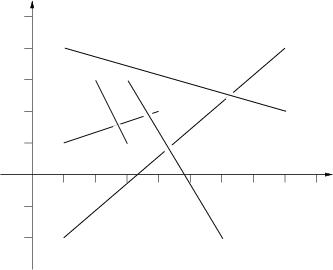Pick-up sticks
| Time Limit: 3000MS | Memory Limit: 65536K | |
| Total Submissions: 9021 | Accepted: 3329 |
Description
Stan has n sticks of various length. He throws them one at a time on the floor in a random way. After finishing throwing, Stan tries to find the top sticks, that is these sticks such that there is no stick on top of them. Stan
has noticed that the last thrown stick is always on top but he wants to know all the sticks that are on top. Stan sticks are very, very thin such that their thickness can be neglected.
Input
Input consists of a number of cases. The data for each case start with 1 <= n <= 100000, the number of sticks for this case. The following n lines contain four numbers each, these numbers are the planar coordinates of the endpoints
of one stick. The sticks are listed in the order in which Stan has thrown them. You may assume that there are no more than 1000 top sticks. The input is ended by the case with n=0. This case should not be processed.
Output
For each input case, print one line of output listing the top sticks in the format given in the sample. The top sticks should be listed in order in which they were thrown.
The picture to the right below illustrates the first case from input.
The picture to the right below illustrates the first case from input.

Sample Input
5 1 1 4 2 2 3 3 1 1 -2.0 8 4 1 4 8 2 3 3 6 -2.0 3 0 0 1 1 1 0 2 1 2 0 3 1 0
Sample Output
Top sticks: 2, 4, 5. Top sticks: 1, 2, 3.
Hint
Huge input,scanf is recommended.
任意仍在地上一些线段,然后求有多少根在最上边,线段相交判定,然后stl暴力。
代码:
/* ***********************************************
Author :rabbit
Created Time :2014/4/20 9:39:31
File Name :8.cpp
************************************************ */
#pragma comment(linker, "/STACK:102400000,102400000")
#include <stdio.h>
#include <iostream>
#include <algorithm>
#include <sstream>
#include <stdlib.h>
#include <string.h>
#include <limits.h>
#include <string>
#include <time.h>
#include <math.h>
#include <queue>
#include <stack>
#include <set>
#include <map>
using namespace std;
#define INF 0x3f3f3f3f
#define eps 1e-10
#define pi acos(-1.0)
typedef long long ll;
int dcmp(double x){
if(fabs(x)<eps)return 0;
return x>0?1:-1;
}
struct Point{
double x,y;
Point(double _x=0,double _y=0){
x=_x;y=_y;
}
};
Point operator + (Point a,Point b){
return Point(a.x+b.x,a.y+b.y);
}
Point operator - (Point a,Point b){
return Point(a.x-b.x,a.y-b.y);
}
Point operator * (Point a,double p){
return Point(a.x*p,a.y*p);
}
Point operator / (Point a,double p){
return Point(a.x/p,a.y/p);
}
bool operator < (const Point &a,const Point &b){
return a.x<b.x||(a.x==b.x&&a.y<b.y);
}
bool operator == (const Point &a,const Point &b){
return dcmp(a.x-b.x)==0&&dcmp(a.y-b.y)==0;
}
double Dot(Point a,Point b){
return a.x*b.x+a.y*b.y;
}
double Length(Point a){
return sqrt(Dot(a,a));
}
double Angle(Point a,Point b){
return acos(Dot(a,b)/Length(a)/Length(b));
}
double angle(Point a){
return atan2(a.y,a.x);
}
double Cross(Point a,Point b){
return a.x*b.y-a.y*b.x;
}
Point vecunit(Point x){
return x/Length(x);
}
Point Normal(Point x){
return Point(-x.y,x.x);
}
Point Rotate(Point a,double rad){
return Point(a.x*cos(rad)-a.y*sin(rad),a.x*sin(rad)+a.y*cos(rad));
}
struct Line{
Point p,v;
double ang;
Line(){}
Line(Point P,Point v):p(P),v(v){
ang=atan2(v.y,v.x);
}
bool operator < (const Line &L) const {
return ang<L.ang;
}
Point point(double a){
return p+(v*a);
}
};
bool SegmentIntersection(Point a1,Point a2,Point b1,Point b2){
double c1=Cross(a2-a1,b1-a1),c2=Cross(a2-a1,b2-a1),
c3=Cross(b2-b1,a1-b1),c4=Cross(b2-b1,a2-b1);
return dcmp(c1)*dcmp(c2)<0&&dcmp(c3)*dcmp(c4)<0;
}
struct Seg{
Point s,e;
}pp[101000];
int ss[100100];
int main(){
//freopen("data.in","r",stdin);
//freopen("data.out","w",stdout);
int n;
while(~scanf("%d",&n)&&n){
for(int i=1;i<=n;i++)
scanf("%lf%lf%lf%lf",&pp[i].s.x,&pp[i].s.y,&pp[i].e.x,&pp[i].e.y);
set<int> st;
set<int>::iterator it,is;
for(int i=1;i<=n;i++){
it=st.begin();
while(it!=st.end()){
if(SegmentIntersection(pp[*it].s,pp[*it].e,pp[i].s,pp[i].e))
is=it,it++,st.erase(is);
else it++;
}
st.insert(i);
}
int cnt=0;
for(it=st.begin();it!=st.end();it++)ss[cnt++]=(*it);
printf("Top sticks: ");
for(int i=0;i<cnt-1;i++)printf("%d, ",ss[i]);
printf("%d.\n",ss[cnt-1]);
}
}








 本文介绍了一种基于平面坐标计算的挑棍游戏算法,通过判断线段间的相交情况来找出哪些棍子位于最顶层。文章提供了完整的实现代码,并详细解释了如何使用STL进行暴力求解。
本文介绍了一种基于平面坐标计算的挑棍游戏算法,通过判断线段间的相交情况来找出哪些棍子位于最顶层。文章提供了完整的实现代码,并详细解释了如何使用STL进行暴力求解。
















 460
460

 被折叠的 条评论
为什么被折叠?
被折叠的 条评论
为什么被折叠?








